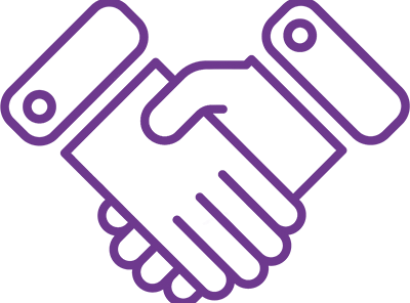

Every person is unique with a different set of experiences, skills and ambitions.
Research shows there are four core personality types each with four sub-types. While a person’s experiences, skills and ambitions change over time, personality is remarkably stable.
Learning about your personality will help you understand your needs and preferences.
This will enable you to make choices which enhance your level of career satisfaction.
Optimists make up about 15% of the global population. There are four types of Optimist: Motivators, Mentors, Guides, and Facilitators. Optimists live to explore their ever-evolving capabilities and to help others maximize their potential.
Optimist types share a number of characteristics. They are often idealistic, intuitive, and authentic. Optimists believe deeply in the potential of others. They are also often loving, kind, trusting and spiritual. Optimists share a passion for creating meaningful relationships with others and with their environment.
In their professional lives, Optimists excel at helping to transform organizations and the people within them. They are energized by the prospect of learning new things and by growing. With Optimists, what you see is what you get. Optimists have a deep sense of authenticity and integrity. Their innate commitment to growth and development often make Optimists highly effective educators and innovators.
Optimist Facilitators make up about 3% of the population. Facilitators have hidden depths and a deep capacity for caring for the inner lives of others. Often calm and serene on the surface, Facilitators have a rich emotional life and feel things very deeply. They see the positive in the world around them and look for ways of making things better for other people.
Facilitators are driven to act by their conscience and beliefs rather than practical considerations. They prefer to help a few people or a single cause and can become overwhelmed and burnt-out if they try to spread themselves too thin.
Facilitators communicate in abstract terms, telling imaginative stories to get their point across. Their visionary and inspiring style lends itself to creative endeavors. They love self-exploration, working to understand who they are and their life’s purpose. Facilitators view their work as a key expression of their identity.
Because they often appear shy, Facilitators can feel misunderstood and lonely. However, when they mix with people they trust, their inner passion shines through. Those close to Facilitators enjoy their inspiration, kindness and positivity. They are adept at helping people see things differently making them trusted advisors.
Facilitators see the positive aspects people or situations. This helps make them resilient in the face of adversity. Facilitators are able to lift the mood of those around them by their positive attitude.
Facilitators have no interest in power politics and seek harmony rather than power. They are highly tolerant of other views and work hard to make sure that everyone has a voice.
Facilitators want the freedom to do what they feel is right and don’t want to be constrained by rules. They give others autonomy so long as their principles are not compromised.
Facilitators connect seemingly unrelated topics. They have a strong imagination and a different way of seeing things which makes them highly innovative.
Once they are inspired by a goal, Facilitators will devote all their energy and emotion to seeing that it is successful.
Facilitators are motivated by vision, optimism and the knowledge that they are doing good. This keeps them going when other personality types become demoralized.
Facilitators can be too hard on themselves and others when they don’t live up to their ideals. They can become dismayed when their plans don’t deliver the vision they had in mind.
For every cause or person they are able to support, Facilitators are aware of many others who they feel that they have let down. Facilitators always want to give more.
Once they are inspired by a vision or cause, Facilitators give it 100% focus. This means they may neglect more urgent or important tasks, practical considerations, and even their own basic needs for food and rest. Such an approach can be harmful to other parts of their lives.
Facilitators are driven by deeply held personal convictions. They find it difficult to give up on their chosen path even when presented with evidence to the contrary. Facilitators are less likely to be influenced by factual data and metrics. They prefer big picture ideas and concepts. This can lead some Facilitators to taking the wrong course of action.
Although Facilitators avoid conflict, they resist feedback and challenges to their ideas. They will invest a lot of time and energy to identify common ground to preserve their values and principles.
Facilitators share very little information about themselves. This means that others may find it difficult to get to know them and to build close personal relationships.
Optimist Facilitators are driven by internal guiding principles and seek purpose and value in their work. They want to know that what they are doing helps others and will provide them with opportunities for self-development. These drivers affect everything they do including how they relate to others and their level of commitment to the tasks.
Facilitators work best in egalitarian and harmonious workplaces. They prefer places which align with their values and allow them to connect emotionally with their colleagues and clients. Facilitators struggle in environments with complex or strict hierarchies, driven by rules and processes.
Facilitators seek autonomy and the time and space to think through projects. They enjoy creating solutions which serve others and allow them to learn and grow. Facilitators tend to prefer a narrow focus and depth instead of broad ranging projects. They prioritize quality over quantity. When Facilitators are passionate about a project, they will commit all of their energy to it. They can sometimes neglect more urgent or important tasks, practical considerations, and even their own basic needs. Some Facilitators can learn to restore their capacity and mitigate burnout by practicing techniques to manage their energy and adopt a holistic focus on their life.
Work gives you meaning and purpose and life is empty without it.
Facilitators make value-based judgements about which activities to pursue. That is, they prefer not to work on things that they don’t deem worthwhile. Consequently, Facilitators sometimes struggle with how to allocate their effort to key priorities. Some Facilitators can improve their ability to focus by integrating simple prioritization hacks into their work routines.
Facilitators prefer transformational work rather than transactional tasks. They need to feel that what they are doing matters to people and society. They find financial or business metrics dry and uninspiring. The most effective Facilitators learn to incorporate metrics or analytics into their decision-making processes or to strengthen their case for proposals they are passionate about.
Facilitators work best either on their own or as part of a small group of like-minded colleagues. They are happy to share ideas and support others and are uncomfortable with conflict. They work hard to maintain harmony in teams and are adept at finding compromise between competing positions.
Facilitators are empathetic and kind and can be highly sensitive to corrective feedback or criticism. They are more likely to be motivated by hearing what they have done right than being told what has gone wrong. Using techniques to reframe critical input can help some Facilitators respond positively and maintain their relationships.
Facilitators are socially reserved and maintain their distance from colleagues. They are highly tolerant of alternative viewpoints. Most Facilitators adopt a live and let live approach. However, they will be quick to speak up if an idea or action challenges their values and principles. Facilitators will also readily defend someone who is being treated unjustly. Facilitators often act as the conscience of the group.
Facilitators enjoy philosophical debates. Such discussions allow them to explore ideas, abstract concepts and ethics. They have less interest in debating technical and business-related subjects.
Alone we can do so little. Together we can do so much.
Facilitators prefer to work in small groups. This allows them to use imagery and stories to convey deeper meaning. Facilitators are excellent at reading emotions, a skill which is are valued by their colleagues and friends.
Their strong sense of integrity means that Facilitators are likely to question thoughts, actions and decisions when no one else will. They can be overly sensitive to things that deviate from their values and principles. Facilitators can sometimes overreact in a way which is not constructive or realistic. Some Facilitators can increase their effectiveness by using techniques to manage their frustration or irritation when they feel resisted or blocked.
Optimist Facilitators are egalitarian and seek autonomy, tending to shy away from positions where they have to manage others. When they do choose to lead others, Facilitators adopt an inclusive and caring style.
Facilitators communicate a compelling vision and give their teams the independence that they themselves enjoy, to get the job done. They act as a sympathetic sounding board if members of their team experience challenges or issues. Because they are reserved, Facilitators may not communicate with members of the team as often as they should. Some may interpret this as a lack of interest or concern. Effective Facilitators invest time to build collaborative relationships with their people and peers. They take time to understand their needs and priorities. This helps them create the support they need to execute complex objectives.Others can benefit bylearning how to flex their management style to the needs of other personality types which can boost team morale and performance.
If your actions inspire others to dream more, learn more, do more and become more, you are a leader.
Facilitators motivate their team through recognition. They highlight accomplishments, even when the individual may not recognize it for themselves. Because Facilitators are personally sensitive to criticism, they struggle to give corrective feedback. They may have difficulty communicating emotionally difficult messages. Some Facilitators can benefit by learning to deliver real-time feedback and coaching with specific behavioral examples to ensure their message is clear and actionable.
Facilitators seek harmony and compromise and will create safe and stable workplaces for their people. In situations where there is an issue with no easy compromise, they find it difficult to favor one side over another. However, once they make a decision, they are good at defusing any ensuing conflict. Some Facilitator leaders can increase the objectivity of their decisions by using simple hacks to test arguments and make fact-based choices.
Facilitators are role models of strong ethics. Their team members are likely to trust their integrity and sense of fairness. Facilitators can struggle when asked to put in place changes that conflict with their sense of fairness. Because they are non-political, they may not fight sufficiently for resources the team needs. They and their team may be overlooked as a result which can negatively impact team morale. Some Facilitators find it helpful to use analytical tools which help them build a strong business case to influence decisions to support their team.
Facilitators can be highly effective people leaders. In some circumstances, their focus on people over tasks can cause issues in driving the performance of their team.The most effective Facilitators use tools to align team objectives to organization goals, monitor performance, and hold people accountable.
Optimist Facilitators have a deep capacity for caring about those with whom they work and the wider world in which they live. They have a well-developed set of personal values which guide their choices and behavior. They are highly tolerant of interpersonal differences and strive to protect nearly anyone whom they perceive to be persecuted.
Facilitators’ strengths lie in people and artistic endeavors. Online business and creative outlets can be a great fit for them. Working as a freelancer, blogger, or influencer allows for direct access to people whom they can help. Here Facilitators can use their communication and empathy skills to make a real difference. Alternatively, they may feel inspired by more traditional artistic pursuits. Working in photography, design, or creative writing can be enriching.
Facilitator’s strong sense of altruism can be activated by working with people to improve their lives. Roles that provide ways to guide others on a journey of self-improvement to improve their lives can be a great fit. Roles that allow Facilitators to connect with people as a physiotherapist, counselor or nurse can tap all their capabilities. They may also find great satisfaction in educational roles such as teaching, clergy, career services, or coaching.
I attribute my success to this - I never gave or took any excuse.
It can be challenging for Facilitators to find a career which they are passionate about in a place that meets their personal needs. They thrive in egalitarian organizations with limited internal competition. Facilitators enjoy having the scope and independence to follow their interests. Facilitators don’t like to be held back by bureaucracy, routine and consistent pressure. They tend to be less pragmatic and analytical than other personality types and better suited to non-technical roles.
Whatever their chosen field, Facilitators need to take special care when selecting organizations to work for. They need to consider the alignment between the culture of the organization they work for and their personal motives and values. Facilitators are likely to enjoy working for smaller organizations as part of a supportive team. They have a greater capacity for self-sacrifice than most other types. Facilitators will thrive in roles that allow some autonomy and time for contemplation to maintain their energy levels. They will be happiest in organizations that reward their ability to serve others through their unique creative expression.
Working in rigid, hierarchical organizations may be more of a challenge. Facilitators tend to be demotivated by work which does not align with their values. Similarly, they may not resonate with workplaces that require a great deal of internal competition, playing politics, or social conformity.
Facilitators help people create positive change in their lives. Their altruism, empathy, and imagination make them a force for good for the people and causes they support. Their almost boundaryless generosity can serve as an inspiration to everyone around them.
Too often, we leave our growth to random chance. That can be frustrating because we can’t always grow as fast as we want (or need) to! While experience can be a great teacher, there is no substitute for learning proven strategies to maximize our potential.
Optimist Facilitators have tremendous capabilities. They also share some common challenges. Possible areas for growth for Facilitators include:

Build stronger relationships with the people who matter most

Keep your cool in stressful situations

Make more impactful decisions faster

Provide others with insight in a way which helps improve their performance

Set up people and teams to drive accountability and achieve measurable results

Achieve more by focusing on your most important priorities

Deliver critical project outcomes on time and on budget

Be strong and productive in times of stress and uncertainty

Adapt your interpersonal approach to build rapport and influence others
Physician & Theologian
Author
Philosopher
Actress
Author
Princess of Wales